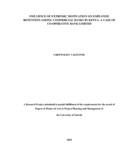| dc.description | The purpose of this study was to establish how extrinsic motivation influences staff retention among commercial banks in Kenya: A case of Co-operative bank Limited. Motivation refers to the process that accounts for an individual’s intensity, direction, and persistence of effort toward attaining a goal. The study was guided by the following objectives: to assess the influence of financial rewards on staff retention among commercial banks in Kenya: A case of Co-operative bank, to examine the influence of fringe benefits on staff retention among commercial banks in Kenya: A case of Co-operative bank, to establish the influence of employment tenure on staff retention among commercial banks in Kenya: A case of Co-operative bank and to explore the influence of work environment on staff retention among commercial in Kenya: A case of Co-operative bank. The study employed a descriptive research design. The study targeted all the employees of co-operative bank in Nairobi west region and the human resource managers. There are 26 co-operative bank branches in the region. The total population was 405 comprising of 397 employees and 8 human resource managers. A sample size of 197 respondents comprising of 4 human resource managers and 193 employees working in branches was derived from the total target population using fishers formula. The study employed purposive sampling to select the human resource department because it is central to motivation. Simple random sampling was eventually used to pick the respondents. Questionnaires and interview schedule were used to collect data from the respondents. The questionnaires were given to the employees and the interview schedule was used to get the responses from the human resource managers. The pilot study was done at Nairobi East region, Kariobangi branch to determine validity of the research instruments. Data analysis employed the use of both quantitative and qualitative techniques. On the issue of financial rewards, 44.7 % of the respondents strongly agreed that giving employees’ bonuses make them to remain in the organization, 57.4 % of the respondents strongly agreed that bank that offers pension scheme to its employees retains them, 55.9% of the respondents strongly agreed that permanent and pensionable term of service makes employees to stay long in the organization and 47.9 strongly agreed that the organization guarantee safe working environment. By the light of the findings of this study, policy makers and implementers within the bank shall have clear knowledge/understanding of motivations factors which are in favor of employee. | en_US |



